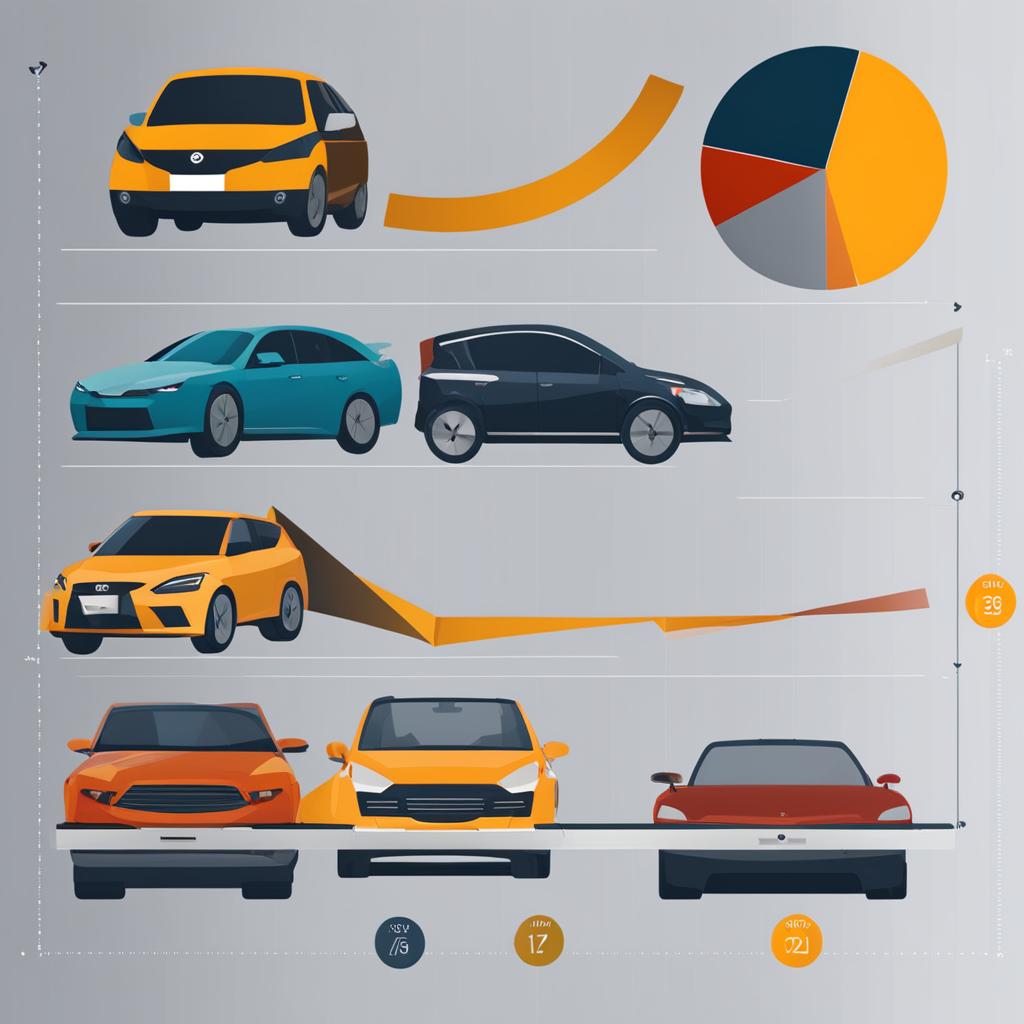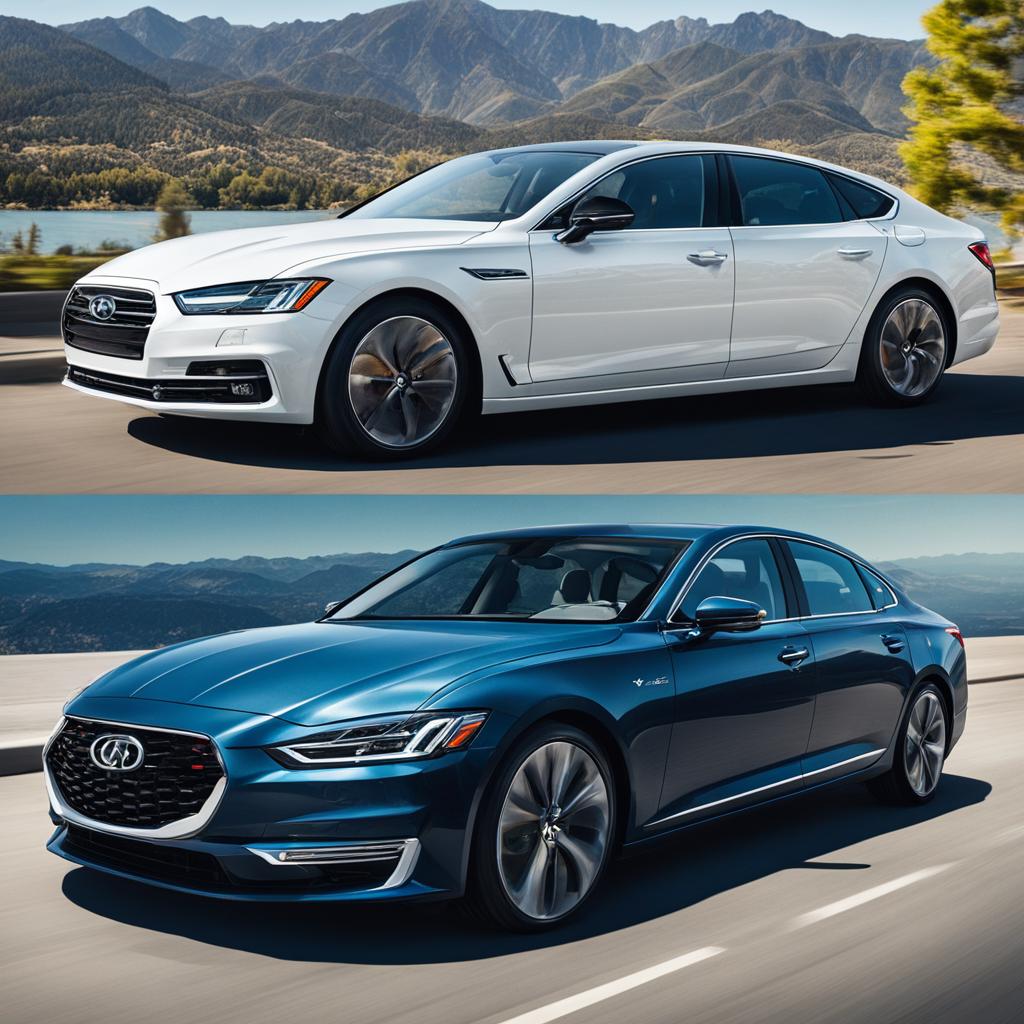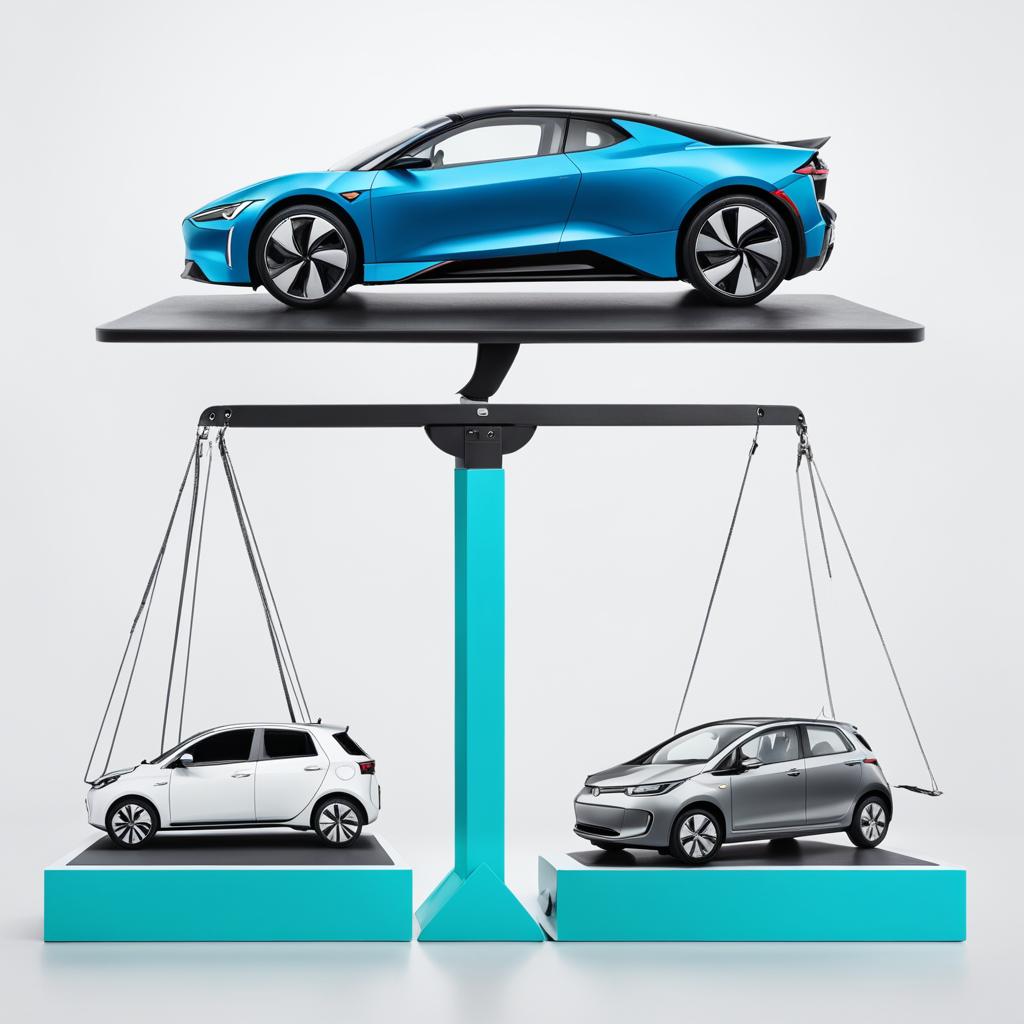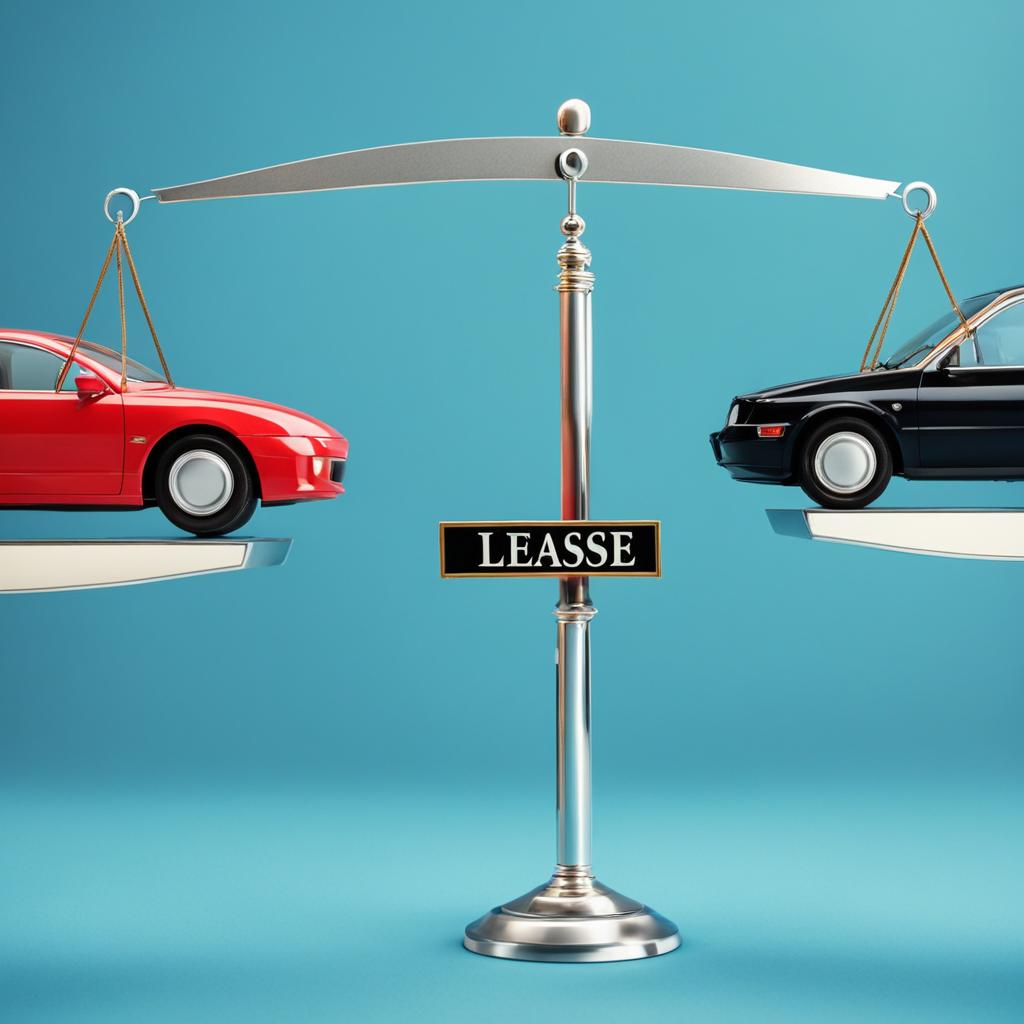When it comes to acquiring a car, many people face the dilemma of whether to lease or buy. Both options have their own advantages and disadvantages, making the decision a tough one to make. To make an informed choice, it’s crucial to understand the key differences between leasing and buying a car.
Leasing a car allows you to drive a new vehicle every few years, with lower monthly payments compared to buying. On the other hand, buying a car provides ownership, allowing you to build equity in the vehicle over time. To help you make a decision, let’s explore the pros and cons of each option.
Key Takeaways:
- Leasing offers lower monthly payments and the opportunity to drive a new car more frequently.
- Buying a car provides ownership and the ability to build equity in the vehicle.
- Consider factors such as your long-term plans, driving habits, and budget to make the best decision for your needs.
Upside of Leasing
Leasing a car offers several advantages. Firstly, lease payments are generally lower than loan payments, as you are only paying for the vehicle’s depreciation during the lease term. This can help free up some of your budget for other expenses or savings goals. Additionally, leasing allows you to drive a new car every few years, avoiding the hassle and cost of owning an older vehicle. This means you can experience the latest features and technologies without committing to a long-term ownership. It’s like having a brand-new car at regular intervals!
Another advantage of leasing is that maintenance and repair costs are often covered under warranty. This provides peace of mind knowing that you won’t have to bear the financial burden of unexpected repairs. Additionally, if you’re someone who likes to have the latest model and doesn’t want to deal with the hassles of selling or trading in an older car, leasing offers the perfect solution. When your lease term ends, you simply return the vehicle to the dealership and can easily get into a new lease for an upgraded model.
Image:
Disadvantages of Leasing
While leasing has its advantages, there are also some drawbacks to consider. One major disadvantage is that you do not own the vehicle at the end of the lease term and must return it. This means you won’t build equity in the car and won’t have an asset to sell or trade-in.
Additionally, leasing typically comes with mileage restrictions, and exceeding these limits can result in additional fees. Many lease agreements include an annual mileage limit, such as 10,000 to 15,000 miles, and every mile you drive beyond this limit can incur charges. This can be a significant concern for those with long commutes or who frequently take road trips.
“One major disadvantage of leasing is that you don’t own the car at the end of the lease term. This means you miss out on the opportunity to build equity in the vehicle and won’t have an asset to sell or trade-in.”
Lastly, there may be fees associated with excessive wear and tear on the leased vehicle. When you lease a car, you are responsible for returning it in good condition, but normal wear, including minor scratches or dings, is usually acceptable. However, if the vehicle has significant damage or requires repairs beyond normal wear and tear, you may be subject to additional charges.
Pros and Cons of Leasing vs. Buying a Car
| Pros of Leasing | Cons of Leasing |
|---|---|
| Lower monthly payments | No ownership or equity in the vehicle |
| Drive a new car every few years | Mileage restrictions and excess mileage fees |
| Generally covered under warranty for repairs and maintenance | Fees for excessive wear and tear |

An Alternative to Long Loans
When it comes to financing a car, many people automatically think of taking out a long-term loan. However, there is another option that offers a shorter commitment and the opportunity to enjoy a new car more frequently. Leasing is a popular alternative to traditional auto loans, providing several advantages for those looking for flexibility and variety.
Leasing allows you to drive a new car for a specified period, typically ranging from two to four years. During this time, you make monthly lease payments that are generally lower than loan payments. Instead of paying for the full purchase price of the vehicle, you only pay for its depreciation during the lease term.
One of the main advantages of leasing is the ability to upgrade to a new car more often. If you enjoy driving the latest models or prefer to have a vehicle that is still under warranty, then leasing can be a great option. Instead of being tied to a car for several years, you have the opportunity to experience different makes and models, keeping up with the latest technology and features.
“Leasing allows me to enjoy the benefits and excitement of driving a brand new car without the long-term commitment of a loan. It also gives me the flexibility to adapt to my changing needs and preferences.”
Another benefit of leasing is the potential for lower maintenance and repair costs. Since leased vehicles are typically under warranty, you can avoid the expenses associated with unexpected repairs. Additionally, some leases include complementary maintenance packages, further reducing the financial burden of regular servicing.
If you’re someone who prefers to have a new car more frequently or doesn’t want the long-term commitment of a loan, leasing is a compelling alternative. It allows you to enjoy the benefits of driving a new car while avoiding the financial and maintenance responsibilities that come with ownership.
To help you decide between leasing and buying a car, let’s compare the two options in the following table:
| Leasing | Buying |
|---|---|
| You don’t own the car | You own the car |
| Lower monthly payments | Higher monthly payments |
| No long-term commitment | Long-term commitment |
| Upgrade to a new car more frequently | Keep the car as long as you want |
| Potential for lower maintenance and repair costs | Responsible for all maintenance and repair costs |
As you can see, leasing offers distinct advantages for those who prefer flexibility, lower monthly payments, and the ability to enjoy a new car more frequently. However, if long-term ownership and building equity in a vehicle are important to you, then buying may be the better option.
Whether you choose to lease or buy a car, it’s important to consider your personal preferences, budget, and long-term plans before making a decision. Ultimately, the choice between leasing and buying depends on what matters most to you and your individual circumstances.

Comparing Loans & Leases
When it comes to financing a car, there are two primary options to consider: loans and leases. Understanding the key differences between the two can help you make an informed decision. Here, I’ll compare loans and leases, highlighting the essential factors you need to consider.
Loan:
With a car loan, you finance the full purchase price of the vehicle. This means you will be making monthly payments to pay off the principal amount plus interest and other finance charges. While loan payments are typically higher compared to lease payments, there are some significant advantages to consider.
Lease:
Leasing, on the other hand, involves paying for the depreciation of the vehicle during the lease term. This results in lower monthly payments compared to a loan. However, it’s crucial to note that you don’t own the car at the end of the lease term. Instead, you must return the vehicle unless you decide to purchase it.
Here’s a breakdown of the key differences between loans and leases:
| Loan | Lease | |
|---|---|---|
| Ownership | You own the car | You do not own the car |
| Monthly Payments | Higher | Lower |
| End of Term | You own the car | You return the car |
To summarize, while loans offer ownership and the opportunity to build equity in the car, leases provide lower monthly payments and the flexibility to drive a new vehicle every few years. The choice between a loan and a lease depends on your personal preferences, financial situation, and long-term plans.

Next, we’ll explore why leasing can be a particularly attractive option for those interested in electric vehicles (EVs).
Better to Lease an EV
Leasing can be a particularly attractive option for those interested in electric vehicles (EVs). The technology of EVs is rapidly evolving, and leasing allows you to stay up-to-date with the latest advancements. Additionally, leasing an EV can provide access to federal and state tax incentives, as well as lower maintenance and operating costs compared to traditional gas-powered vehicles.

If you’re considering making the switch to an electric vehicle, leasing can offer several benefits. One of the main advantages is the opportunity to drive the latest EV models without the long-term commitment of ownership. As the technology continues to improve, new EVs with longer battery ranges and enhanced features become available. Leasing allows you to enjoy these technological advancements as they become available, ensuring that you’re always driving a cutting-edge vehicle.
Access to Tax Incentives
Leasing an EV can also provide access to attractive tax incentives. Federal and state governments often offer incentives and rebates to encourage the adoption of electric vehicles. These incentives can significantly reduce the overall cost of leasing an EV, making it an even more affordable option. By taking advantage of these incentives, you can save money while driving an environmentally friendly vehicle.
Lower Maintenance and Operating Costs
Another compelling reason to lease an EV is the potential for lower maintenance and operating costs. Electric vehicles have fewer moving parts compared to traditional gasoline-powered cars, resulting in reduced repair and maintenance expenses. Additionally, charging an EV is often more cost-effective than refueling a gas-powered vehicle. Over the course of a lease term, these savings can add up and contribute to a more affordable ownership experience.
| Advantages of Leasing an EV | Advantages of Buying an EV |
|---|---|
| Access to the latest EV models and technologies | Ownership and the ability to build equity |
| Lower monthly payments | No mileage restrictions |
| Potential tax incentives and rebates | No end-of-lease charges or restrictions |
| Limited maintenance and operating costs | Freedom to customize and modify the vehicle |
Ultimately, the decision to lease or buy an EV depends on your individual needs and preferences. Leasing offers the flexibility to experience the latest EV technology while potentially benefiting from tax incentives and lower costs. On the other hand, buying an EV provides ownership and the ability to build equity in the vehicle. Consider your long-term plans, budget, and driving habits to determine which option best aligns with your goals.
Don’t Forget to Negotiate
When it comes to leasing or buying a car, one important aspect to keep in mind is the power of negotiation. Whether you’re considering a lease or a purchase, negotiating the terms of the deal can help you secure a better agreement and save money. Here are some key negotiation points to consider:
Leasing Negotiations
- Vehicle Cost: You can negotiate the cost of the vehicle when leasing. Research the market value of the car you’re interested in and use that information as leverage during negotiations.
- Lease Term: The lease term determines the length of your commitment and monthly payments. Negotiate a lease term that fits your budget and aligns with your driving needs.
- Mileage Limit: Most leases come with mileage restrictions. If you know you’ll require additional mileage, negotiate a higher limit to avoid excess mileage fees.
- End-of-Lease Fees: Discuss and clarify any potential end-of-lease fees upfront to avoid surprises. Negotiate to reduce or eliminate these fees if possible.
Purchase Negotiations
- Purchase Price: When buying a car, negotiate the purchase price to ensure you’re getting the best deal. Research the market value of the vehicle and use that information to negotiate a lower price.
- Interest Rate: If you’re financing your purchase, negotiate the interest rate with the lender. A lower interest rate can significantly reduce your monthly payments.
- Trade-In Value: If you plan to trade in your current vehicle, negotiate the trade-in value to maximize your return. Get multiple quotes and use them as leverage during negotiations.
- Financing Terms: Negotiate the financing terms, such as the length of the loan and any additional fees. Aim for favorable terms that suit your financial situation.
Negotiating the terms of your lease or purchase can make a significant difference in the overall cost of acquiring a car. Whether you’re leasing or buying, don’t be afraid to negotiate and advocate for the best deal possible.
How Loans & Leases Differ
Loans and leases are distinct when it comes to acquiring a car. Understanding the differences between these options can help you make an informed decision. With a loan, you own the vehicle and make monthly payments to pay off the loan, while with a lease, you are essentially renting the vehicle for a set period of time.
When it comes to payments, loan payments are generally higher as you’re paying off the entire purchase price of the vehicle, plus interest and other finance charges. On the other hand, lease payments are usually lower because you’re only paying for the vehicle’s depreciation during the lease term, along with interest charges, taxes, and fees.
Another important distinction is ownership. Buying a car through a loan means you own the vehicle, giving you the freedom to keep it for as long as you want. However, when you lease a car, you don’t own it and must return it at the end of the lease term, unless you decide to purchase it.
Let’s take a closer look at the differences between loans and leases:
| Loans | Leases | |
|---|---|---|
| Ownership | You own the vehicle | You don’t own the vehicle, unless you decide to purchase it |
| Monthly Payments | Higher payments as you’re paying off the full purchase price, plus interest | Lower payments as you’re paying for depreciation, along with interest charges, taxes, and fees |
| End of Term | You keep the car | You return the car, unless you decide to purchase it |
It’s essential to consider your preferences and financial circumstances before deciding between a loan and a lease. If owning a vehicle and building equity is important to you, a loan might be the better option. However, if lower monthly payments and the ability to drive a new car more frequently appeal to you, leasing may be the way to go.
Remember, each choice has its advantages and considerations, so it’s crucial to weigh your options carefully before deciding whether to lease or buy a car.
Ownership
One of the main differences between leasing and buying a car is ownership.
When you buy a car, you own it and can keep it as long as you want. It becomes your asset, giving you the freedom and flexibility to do as you please.
However, when you lease a car, you don’t own it. Instead, you have the privilege of using it for a set period of time, usually a few years. At the end of the lease term, you must return the car to the leasing company unless you decide to purchase it.
The advantages of ownership
- You have the freedom to modify or customize the car according to your preferences.
- You can sell or trade-in the car whenever you want, giving you the opportunity to recoup some of your investment.
- You are not bound by mileage restrictions, allowing you to drive as much as you desire without incurring extra charges.
The benefits of leasing
Leasing a car eliminates the responsibility of ownership and offers certain perks. It allows you to drive a new car every few years, enjoying the latest technology and features without the hassle of maintenance or repair costs. Leasing also provides predictable monthly payments, as you’re only paying for the depreciation of the vehicle rather than the full purchase price. Additionally, leased vehicles are often covered under warranty, providing peace of mind and potential savings on unexpected repairs.
If you prioritize ownership and the long-term investment of a vehicle, buying a car is likely the better option for you. However, if you prefer the flexibility, lower monthly payments, and the opportunity to drive a new car more frequently, leasing may be the more suitable choice. Consider your personal preferences, financial situation, and future plans before making a decision.
As always, it’s crucial to consult with a financial advisor or automotive specialist to explore all the factors specific to your situation and make an informed decision that aligns with your needs and goals.
Up-Front Costs
When deciding whether to lease or buy a car, it’s essential to consider the up-front costs associated with each option. The costs differ depending on whether you choose to purchase or lease a vehicle.
When buying a car, you typically have to pay a down payment, taxes, registration fees, and other additional fees. These costs can quickly add up, impacting your initial financial outlay. However, buying a car allows you to eventually own the vehicle, giving you the flexibility to sell or trade it in the future.
On the other hand, leasing a car also has its own set of up-front costs. These costs can include the first month’s payment, a refundable security deposit, an acquisition fee, taxes, registration fees, and other applicable fees. While the up-front costs of leasing may be lower than buying, it’s essential to factor them into your budget when considering the overall affordability of leasing a car.
In comparing the up-front costs of leasing versus buying a car, it’s crucial to analyze your financial situation and determine which option aligns better with your budget and goals. Consider your immediate financial capacity, long-term plans, and preferences to make an informed decision.
Visually appealing and relevant to the topic of up-front costs, the image above depicts a person contemplating between leasing and buying a car—highlighting the financial considerations involved in making this decision.
Monthly Payments
When considering whether to lease or buy a car, one important factor to consider is the monthly payments. The payment structure differs between the two options, with loan payments generally being higher compared to lease payments.
When you buy a car, you are financing the entire purchase price of the vehicle along with interest charges and other finance fees. This higher overall cost results in larger monthly loan payments. On the other hand, when you lease a car, you’re only responsible for paying for the vehicle’s depreciation during the lease term, along with interest charges, taxes, and fees.
This difference in payment structure is why lease payments tend to be lower than loan payments. By focusing on depreciation instead of the full vehicle price, leasing allows you to have more manageable monthly payments.
If your budget is a primary concern and you’re looking for a more affordable option, leasing might be the better choice. However, it’s important to note that lease payments don’t contribute to building equity in the car as they solely cover the use of the vehicle during the lease term.
To illustrate the contrast between lease and loan payments, consider the following example:
| Lease | Loan | |
|---|---|---|
| Vehicle Price | – | $30,000 |
| Lease Term | 36 months | – |
| Loan Term | – | 60 months |
| Lease Down Payment | $2,000 | – |
| Loan Down Payment | – | $5,000 |
| Monthly Payment | $300 | $500 |
| Total Payment | $10,800 | $30,000 |
This example clearly shows the difference in monthly payments between leasing and buying a car. While the lease payments amount to $300 per month, the loan payments are considerably higher at $500 per month. Over the course of the lease term, the total payments for leasing add up to $10,800, while the loan payments total $30,000.
It’s crucial to carefully consider your financial situation, monthly budget, and long-term goals when deciding whether to lease or buy a car. Analyzing the monthly payment structure is an essential step in making an informed decision that aligns with your preferences and needs.
Remember, if you decide to lease, you won’t have ownership of the vehicle at the end of the term, and you’ll need to return it. On the other hand, buying a car allows you to build equity and have ownership. Take your time to evaluate the pros and cons of each option before making a choice that suits your lifestyle and financial circumstances.
Mileage
Mileage restrictions play a significant role in the decision-making process when considering whether to lease or buy a car. If you choose to buy a car, you have the freedom to drive as many miles as you want without incurring any additional fees or restrictions. This flexibility allows you to embark on those long road trips without worrying about exceeding predetermined limits.
On the other hand, when leasing a car, it’s essential to be mindful of the mileage limits specified in the lease agreement. Most leases come with mileage restrictions, typically ranging from 10,000 to 15,000 miles per year. These limits are in place to protect the car’s value and ensure that it remains within the predetermined value range at the end of the lease term.
Exceeding the mileage limits set by the lease agreement can result in additional charges, which can quickly add up. These extra charges might include fees for each mile driven over the limit or a higher monthly payment to account for higher depreciation due to the increased mileage.
Lease vs. Buy: Mileage Considerations
When deciding whether to lease or buy a car, it’s essential to evaluate your driving habits and needs. Assessing your typical mileage and determining whether it falls within the limits imposed by lease agreements can help you make an informed decision.
If you have a long daily commute, frequently embark on road trips, or have a lifestyle that requires extensive driving, buying a car might be more suitable for you. Owning a car allows you the freedom to drive as much as you need without any mileage restrictions or the fear of incurring additional charges.
Conversely, if you have a shorter daily commute or generally drive fewer miles per year, leasing can be a viable option. It offers the advantage of lower monthly payments and the opportunity to upgrade to a new vehicle every few years while avoiding potential maintenance costs associated with owning an older car.
Ultimately, understanding your driving habits and evaluating your need for flexibility in mileage can guide you towards the most suitable option when deciding whether to lease or buy a car.
| Leasing | Buying |
|---|---|
| Comes with mileage restrictions | No mileage restrictions |
| Exceeding mileage limits may result in additional fees | No additional charges for exceeding mileage limits |
| May be more suitable for low-mileage drivers | More suitable for high-mileage drivers |
Conclusion
When it comes to deciding whether to lease or buy a car, there are several factors to consider. Personal preferences and financial circumstances play a crucial role in making an informed decision. Leasing offers the advantage of lower monthly payments and the opportunity to drive a new car more frequently. On the other hand, buying a car provides ownership and the ability to build equity in the vehicle.
Consider your long-term plans, driving habits, and budget when making this important decision. If you prefer to have a new car every few years and prioritize lower monthly payments, leasing may be the right choice for you. However, if you value ownership and want to have an asset to sell or trade-in, buying may be more suitable.
Ultimately, there is no one-size-fits-all answer. It’s essential to evaluate your individual needs and weigh the pros and cons of each option. Whether you decide to lease or buy a car, keeping your long-term goals and budget in mind will help you make the best choice for your situation.
FAQ
What are the advantages of leasing a car?
Leasing a car offers lower monthly payments, allows you to drive a new car every few years, and typically includes warranty coverage for maintenance and repairs.
What are the disadvantages of leasing a car?
One major drawback is that you don’t own the vehicle at the end of the lease term and must return it. There are also mileage restrictions and potential fees for excessive wear and tear.
Is leasing a car a good alternative to taking out a long car loan?
Yes, leasing allows you to drive a new car for a shorter period, which can be appealing for those who prefer to have a new car more frequently or who don’t want a long-term commitment.
How do loans and leases differ?
With a loan, you’re financing the full purchase price of the vehicle and paying off the principal. With a lease, you’re paying for the depreciation of the vehicle during the lease term.
Should I lease or buy a car if I’m interested in electric vehicles?
Leasing can be a particularly attractive option for electric vehicles, as it allows you to stay up-to-date with evolving technology and provides access to tax incentives and lower operating costs.
Should I negotiate when leasing or buying a car?
Yes, when leasing or buying, it’s important to negotiate factors such as the vehicle cost, lease or loan terms, mileage limits, and any additional fees to secure a better deal and save money.
How do loans and leases differ in terms of ownership?
With a loan, you own the vehicle and can keep it as long as you want. With a lease, you don’t own the car and must return it at the end of the lease term, unless you decide to purchase it.
What are the up-front costs when leasing or buying a car?
When buying, you typically have to pay a down payment, taxes, registration fees, and other fees. With leasing, the up-front costs can include the first month’s payment, a refundable security deposit, an acquisition fee, taxes, registration fees, and other fees.
How do monthly payments differ between leasing and buying a car?
Loan payments are generally higher because you’re paying off the full purchase price of the vehicle, plus interest and finance charges. Lease payments are usually lower because you’re only paying for the vehicle’s depreciation during the lease term, plus interest charges, taxes, and fees.
What should I consider regarding mileage when deciding to lease or buy a car?
When buying, you’re free to drive as many miles as you want without incurring additional fees. Most leases come with mileage limits, and exceeding these limits can result in extra charges.
Our Friends
- https://www.consumerfinance.gov/ask-cfpb/what-should-i-know-about-leasing-versus-buying-a-car-en-815/
- https://www.consumerreports.org/cars/buying-a-car/leasing-vs-buying-a-new-car-a9135602164/
- https://www.cnbc.com/select/buy-or-lease-car/
Money posts:
 Turo Review | Make Money Renting Out Your Car (2024)
Turo Review | Make Money Renting Out Your Car (2024)
 Turo Review in 2024: Can You Actually Make Money with Turo Car Sharing?
Turo Review in 2024: Can You Actually Make Money with Turo Car Sharing?
 Peddle Review | Should You Sell Your Junk Car to Peddle in 2024
Peddle Review | Should You Sell Your Junk Car to Peddle in 2024
 Rent or Buy? How I Made $350,000 in 4 Years
Rent or Buy? How I Made $350,000 in 4 Years
 What Is Direct Lending? A Beginner’s Guide
What Is Direct Lending? A Beginner’s Guide
 What is a Cash-Out Refinance? (2024)
What is a Cash-Out Refinance? (2024)
 What is Amazon FBA? How it Works, Fees, & More (2024)
What is Amazon FBA? How it Works, Fees, & More (2024)
 How to Save Money in College: Effective Strategies (2024)
How to Save Money in College: Effective Strategies (2024)

